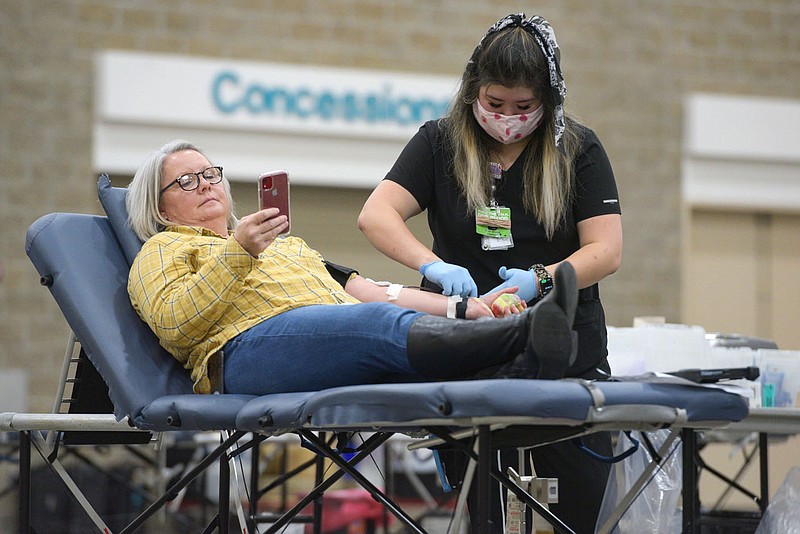As the omicron variant spreads in Arkansas, schools and businesses are canceling blood drive events, making it harder for blood banks to keep hospital shelves stocked.
The Arkansas Blood Institute, which serves most of the state, isn't seeing the same extreme shortages that others are across the nation, Executive Director Mario Sedlock said, but covid-19 challenges are still making blood collection difficult.
"The omicron variant has impacted us similar to when we were initially dealing with covid two years ago," Sedlock said Wednesday. "We are experiencing more blood drive cancellations at schools and businesses."
As events cancel, it is important that those in Arkansas continue to seek out ways to donate, Sedlock said. A large event, such as a snow storm, or a mass causality event could strain the blood supply.
"If you are able to donate, we need you to come in and donate," Sedlock said.
The American Red Cross declared a national blood crisis for the first time in history Tuesday. A release from the organization said it's the worst shortage in more than a decade, which has raised concern about risks for patient care.
"Amid the crises, doctors have been forced to make difficult decisions about who receives blood transfusions and who will need to wait until more products become available," the release said.
[CORONAVIRUS: Click here for our complete coverage » arkansasonline.com/coronavirus]
Sedlock said the Arkansas Blood Institute isn't at the same level of crises.
"I want to give all the credit to the wonderful people of Arkansas," Sedlock said. "They are the reason we have been able to meet our hospital demand."
Dr. Tina Ipe, the University of Arkansas Medical Sciences' medical director of the Blood Bank and Transfusion Division and a professor of pathology, said she works with the Arkansas and Oklahoma blood institutes for blood supply.
"We have not had the shortages that the rest of the country is seeing, but there is always a downstream affect," Ipe said. "We at UAMS understand that there might be impending shortages that might occur."
The hospital is working with the blood institutes to increase collection through their own blood drives, Ipe said.
"We are all trying to proactively work so that we don't have that issue," Ipe said.
Ipe also said a mass casualty event could put the blood supply at a crisis level. She said typically agreements with neighboring blood banks help in disaster situations such as tornadoes.
"If the nation is having a shortage then there is really no way for us to help them and them to help us," Ipe said. "We as physicians don't want to have to ration any care that we have to provide for our patients. We really don't want to have to decrease the care that we give our patients."
The hospital recently moved into Crisis Standards of Care, which includes delaying elective procedures, she said. This partly is because of a reduction in staff as covid spreads.
Delayed surgeries also help reduce the use of blood supply, she said.
Convalescent plasma for covid-19 patients also is a major need, Ipe said. This is donated blood with covid-19 antibodies that help those who are severely ill or immune comprised battle the virus.
The Food and Drug Administration recently changed the amount of antibodies that needed to be in the convalescent plasma to work, Ipe said.
"We don't have any in our supply that meet those guidelines," Ipe said. "If it was my mother, father or brother who was in the hospital with an immune compromised disease, such as leukemia, I would want to have some of this treatment available for them."
Sedlock said antibody tests are available for anyone who donates blood through the institute. Those with enough antibodies to donate plasma are given the option to donate as well.
"From a hospital standpoint, we appreciate OBI and ABI's efforts such that we don't have to ration blood products to our patients," Ipe said. "But we encourage blood donors to go to their local donor center to donate either CCP or blood."
The only way to gain the supply is through donation, Ipe said.
"There is no other way for us to get blood," Ipe said. "We can't get it from animals or artificial options. Blood is blood, and it only comes from humans. When we hear there is a national shortage, it worries us."

